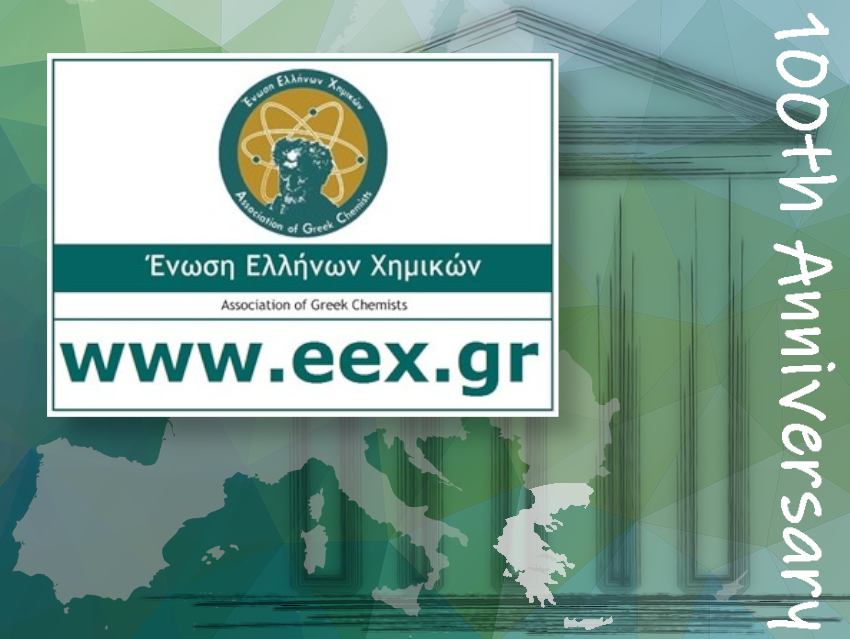The Association of Greek Chemists (AGC, in Greek: Ένωση Ελλήνων Χημικών or EEX) is the official professional association and institutional body of Greek chemists. It is a public legal entity under the Ministry of Development. Its headquarters are in Athens at Kaniggos 27. It was founded in 1924 to act as an official advisor to the Greek government on matters related to chemistry.
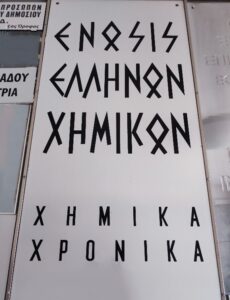
Figure 1. The sign at the entrance of the headquarters building of the Association of Greek Chemists and the editorial office of Chimica Chronica.
1 History of Chemistry in Greece
Chemistry has been taught in Greece as a category of natural sciences since the 19th century. In 1837, chemistry was taught at the University of Athens by the Bavarian Dr. Xavier Landerer (1809–1885), and later by Alexander Venizelos and Anastasios Christomanos (1841–1906). The first public chemical laboratory was established on Lesbos, the third largest island in Greece, while the island was under Turkish occupation by Dr. Michail K. Stefanidis (1868–1957).
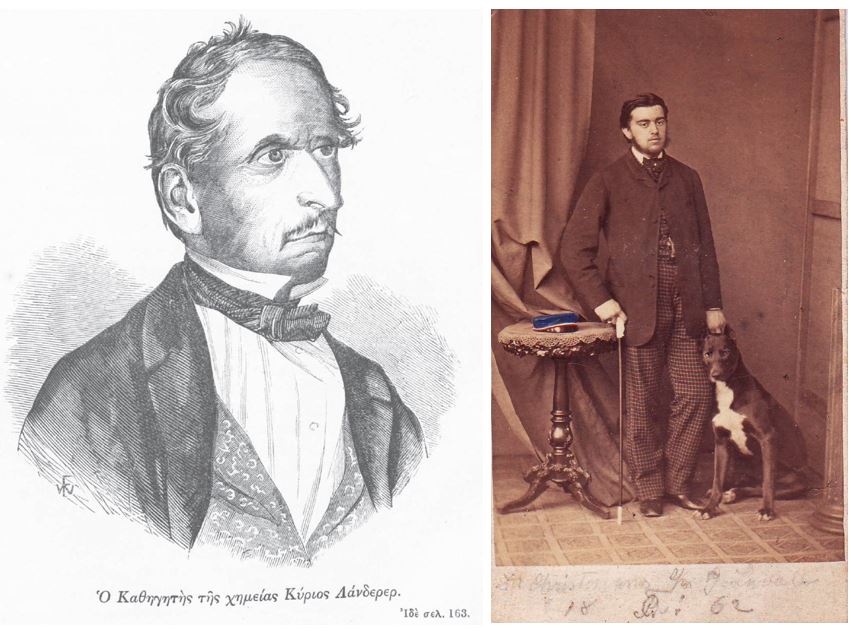
Figure 2. Some major figures in the history of chemistry in Greece. From right to left: Xavier Landerer (1809–1885) and Anastasios Christomanos (1841–1906).
In 1900, the first Greek Chemical Laboratory was founded in Chania, Crete, which was then bombed and destroyed in 1941, during the attempt of the German military forces to occupy Crete. The Department of Chemistry of the University of Athens and the Department of Chemical Engineering of the National Technical University of Athens, sometimes known as the Polytechnic of Athens, were founded in 1918.
2 Foundation of the Association of Greek Chemists
2.1 An Idea of a Group of Students
On the afternoon of March 31, 1924, the graduate chemist students Angelos Dimitriou, Ioannis Kandilis, Dionysios Karathanasis, Yannis Karakalos, Nikolaos Karnis, D. Kopas, Chrysostomos Malagardis, Leon Pintos, and Chr. Fasseas met at the house of the graduate chemist Zoi Mela-Ioannidis at 17 Asteriou Street in Athens. These chemists belonged to a group of students who formed the core of the first graduate students of the Department of Chemistry of the University of Athens. The purpose of the meeting was to exchange views on the establishment of a chemists’ association based on what they had discussed in their previous meetings.
At this meeting, a founding declaration was read, which had been drafted the day before by I. Kandilis. This historic document constitutes the essential founding act of the “Union of Greek Chemists” and is its first written document. At this meeting, a committee of three was appointed, consisting of Zoi Mela-Ioannidis, Ioannis Kandilis, and X. Faseas, whose first action was to draw up the statutes, which were presented on April 21, 1924, at a meeting of the same group at the home of Zoi Mela-Ioannidis.
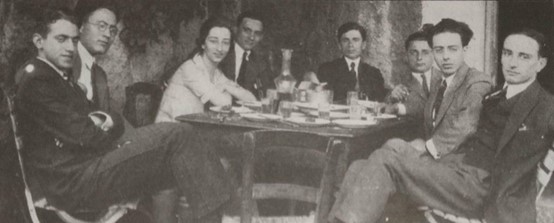
Figure 3. The historical photo of the founding members of the Association of Greek Chemists. From left to right: Angelos Dimitriou, Nikolaos Karnis, Zoi Mela-Ioannidis, Yannis Karakalos, Ioannis Kandilis, Chrysostomos Malagardis, Dionysios Karathanasis, and Savvas Anagnostopoulos. The photo was taken on June 23, 1923, in a tavern in Kifissia-Athens during a group excursion.
2.2 The First General Assemblies
The members of the group thought that to convince more members, they would have to attract and ask for the help of more senior chemists who already held positions as chemists at the University and Polytechnic School, in the chemical and pharmaceutical industry, in public administration, etc. Thus, professors and lecturers such as K. Veis, K. Zengelis, G. Mathiopoulos, D. Chondros, St. Hors, Tel. Komnenos, and D. Dalmas were invited.
Those who agreed with the idea of establishing the Association were invited to a General Assembly on June 30, 1924, with a temporary committee consisting of D. Karathanasis, K. Veis, Evkl. Sakellariou, Cl. Fillaretos, and N. Zarpas. However, due to the disagreement of many participants on the nature of the Association, i.e. whether it would be a professional or a scientific association, a decision was postponed to July 7.
The General Assembly was held in the auditorium of the Chemistry Building of the University of Athens at 104 Solonos Street, with a large participation of chemists for the time. At the suggestion of N. Zarpas, the Statutes were discussed, four new members were added to the Committee (Mathiopoulos, Zalokostas, Gallopoulos, and Bourlos), and the enlarged Committee undertook the completion of the Statutes, making the changes suggested by the General Assembly and proceeding with the invitation to a new General Assembly.
The new General Assembly met on August 4, 1924. The Statutes were adopted and the founding act of the Association was signed with the final title “UNION OF GREEK CHEMISTS” (ΕΝΩΣΙΣ ΕΛΛΗΝΩΝ ΧΗΜΙΚΩΝ). Professor G. Matthaiopoulos was appointed as its first President and on August 13, 1924, the Statute was recognized by the Court of First Instance of Athens.
3 The Association of Greek Chemists Today
Today, the Association of Greek Chemists (AGC) has approximately 14,000 registered members who are all university graduates and is the only scientific organization that legally represents the Greek chemists in state committees in the country and abroad. It is structured in ten peripheral branches that cover the whole country and several scientific working groups.
It aims to promote the science of chemistry in industry, education, and research within the country and abroad and, thus, contribute to the economic, social, and cultural development of Greece. Also, its goal is to promote the chemical profession in the country, protect the benefits and the professional rights of chemists, and contribute to the collaboration and solidarity among its members.
Its activities are traditionally connected with academic, scientific, and professional life: organizing scientific and professional events, meetings, conferences, symposia, seminars, and courses. The AGC publishes the bimonthly journal Chimica Chronica, first published in 1936, a general edition in Greek which is distributed to all registered members. The AGC is a member of Chemistry Europe, an association of 16 chemical societies from 15 European countries. Chemistry Europe publishes several high-quality scientific chemistry journals covering a wide range of specialties, as well as the online magazine ChemistryViews.
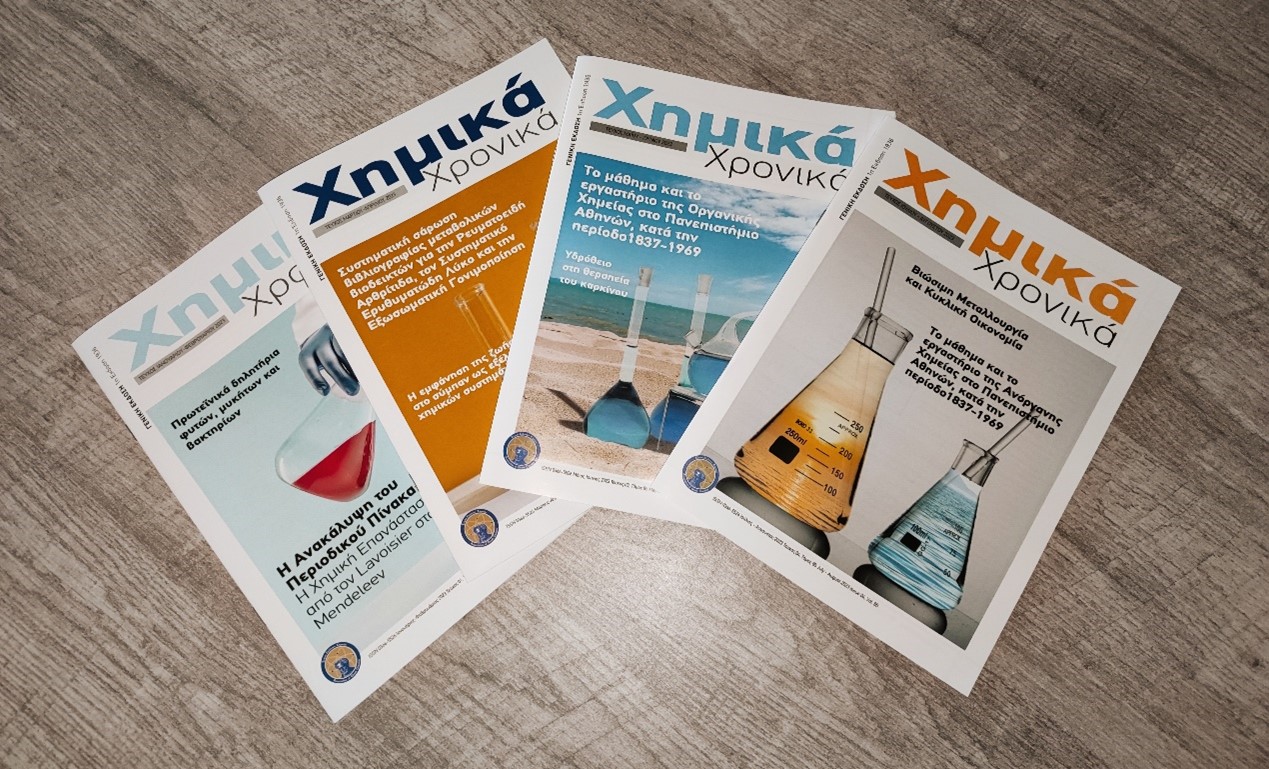
Figure 4. The latest issues of Chimica Chronica, the periodical of the AGC since 1936.
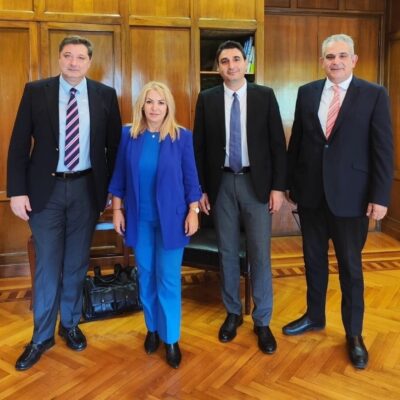
Figure 5. From left to right: Dr. Athanasios Papadopoulos (former President and current Treasurer of the AGC), Ms Anna Mani Papadimitriou (Deputy Minister of Development of Greece), Dr. Ioannis Katsogiannis (current President of the AGC), and Dr. Ioannis Sitaras (current General Secretary of the AGC).
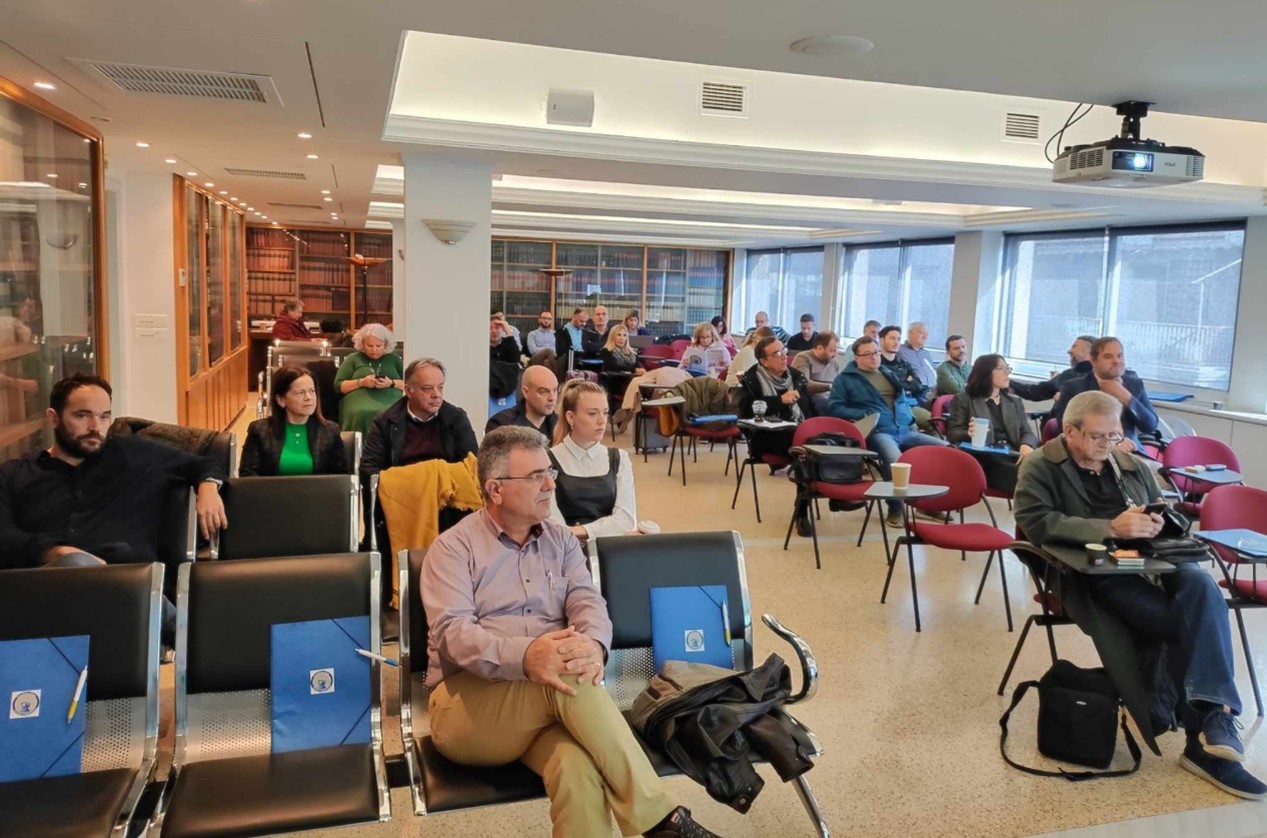
Figure 6. Photograph from the latest meeting of the General Assembly of the AGC at the headquarters in Athens.
On an annual basis, the AGC organizes the pan-Hellenic student chemistry competition for high school students and numerous Panhellenic and international conferences.
The Association participates through its representatives to several national councils such as:
- The Supreme Chemistry Council
- The National Council of Accreditation
- The National Advisory Board on Research
- The National Council on Health and Safety
- The National Council of Certification
- The National Council of Higher Education
- The National Council of Quality and Development
- The National Council of Recognition of Professional Equivalence of Titles of Universities
- The National Council of Policy of Food Control
and various national committees such as:
- Committee on Energy and Environment
- Committee on the Curriculum of High School Chemistry
- Committee on Explosives
- Various Technical Committees of the National Standardization Organisation etc.
AGC is a member of EuChemS (European Chemical Society) and IUPAC (International Union of Pure and Applied Chemistry), participating in their various committees and activities.
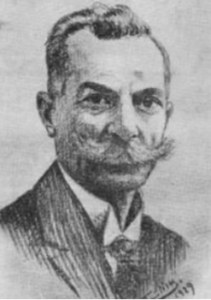
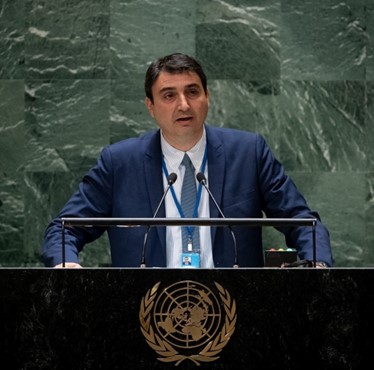
Figure 7. Left: The very first President of the Association of the Greek Chemists, Georgios Mattheopoulos (1873–1958), a 19th-century Greek university professor who is considered the “father” of the chemical profession in Greece. Right: Ioannis Katsoyiannis, the current President of the Association of Greek Chemists (2021–2024) and Professor at Aristotle University of Thessaloniki, speaking at the General Assembly of the United Nations during the UN Water Conference, held in New York, USA, in March 2023.
Authors
Dr. Spiros Kitsinelis, Vice Editor-in-Chief of Chimica Chronica and Managing Editor of the Journal of the Association of Greek Chemists
Professor Milt Karayannis, Editor-in-Chief of Chimica Chronica
- Official website of the Association of Greek Chemists (AGC)/Ένωση Ελλήνων Χημικών (EEX)
Also of Interest
